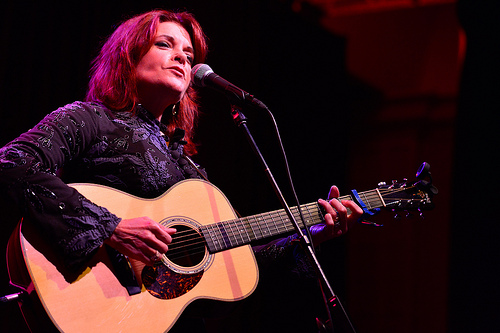 On a day when she finished mastering her new album “The River and the Thread,” Rosanne Cash played a few songs from it and talked about its origins from deep in the South where her famous father was raised.
On a day when she finished mastering her new album “The River and the Thread,” Rosanne Cash played a few songs from it and talked about its origins from deep in the South where her famous father was raised.
Her comments — and performance — came at a TV Critics Association summer press tour session in Beverly Hills Monday, to promote an upcoming PBS film on Americana music called “Nashville 2.0.”
But the music from “The River and the Thread” speak to a deeper South than that, to rural Arkansas.
“Arkansas State University bought my dad’s boyhood home, which was part of a New Deal-era colony in Diaz, Ark.,” Cash said. “During FDR’s New Deal, there were 500 cottages given to extremely poor people. There are 40 left standing, and my father’s home was one of them. It was dilapidated near to the ground. Arkansas State University bought it to restore it and to start a kind of music heritage site there and a museum and to restore, in fact, the whole colony.
Cash says “I get asked to participate in Johnny Cash projects every day of my life, and I say no to 99 percent of them. When I heard about this, I was full on in it. This was I knew that my dad would have loved this more than anything else.”
Thus began a series of visits South, to the site and to fundraising concerts there to benefit the project. Each time, she says, she was “getting really involved and reconnecting with people I knew in the South, my own ancestry” as well as meeting new people.
“Every time I went down, it was like this layer peeled off of my objectivity about it, and my heart really opened up again to these places and these people, and we started writing the songs,” she says.
With husband John Leventhal, who co-wrote and produced the album, they took side trips to blues country. “We took a trip in the Delta that was unbelievable, to Robert Johnson’s grave and to, you know, the place where all of the greatest blues musicians were from. And it’s been one of the most enriching experiences of my life musically and personally.”
As a result she came up with songs she played Monday like “50,000 Watts of Common Prayer” and “Etta’s Tune” that will be part of her first album of original material since 2006’s “Black Cadillac.”
In between came the 2009 covers album “The List,” which was derived from a list Johnny Cash wrote for her in 18 of 100 essential songs. She played one of them,that her father also played, “Long Black Veil,” but also one that would be No. 101 on the list, a haunting “Ode to Billie Joe.”
A second volume of “The List” will come some time, she said, ” sometime but not now.”
Of “The List,” Cash said it came when “I had just graduated high school, and I went on the road with him.
“I was not interested in country music,” Cash says. “I liked The Beatles and Elton John. I liked Creedence and The Band and Blind Faith. I grew up in Southern California in the ’60s and ’70s, and that’s the music I loved.”
She was exposed to the country music in the home, though, “and Ray Charles’s ‘Modern Sounds in Country and Western Music’ kind of went in on a cellular level at that time. But, on that tour, he we were talking about songs, and he mentioned a song. I said, ‘I don’t know that one,’ and then he mentioned another. I said, ‘I don’t know that one.’ And he got very alarmed. He felt that I had half of my musical education. So he made this list for me, and he said, ‘This is your education.’”
He jotted down the list in the back of a bus over a two hour period.
“There was no Google,” she said, but “he had the instincts of a musicologist. He was he listened to everything.”
Asked what music outside of the List has made a difference to her, Cash said, “I listen to everything, everything from The Decemberists to Bill Monroe to Aaron Copland,” but the one that stood out was a jazz great. “Miles Davis got me through a divorce,” she said mentioning “Kind of Blue” and “Sketches of Spain.” “I just listened to that record obsessively,” in part because it had no words.
“Sometimes you just want you don’t want to be distracted by language,” she said. “You just want the language of the music. And, also, I just think that all of the problems in the world could be solved if you just locked politicians in a room with ‘Kind of Blue’ and just, like, let their minds expand.
“But all music is like that. I mean, it heals us,” she said. “To be a musician is to be in a service industry because it heals us.”
“Nashville 2.0” airs on PBS Nov. 22; “The River and the Thread” is due out Jan. 14.